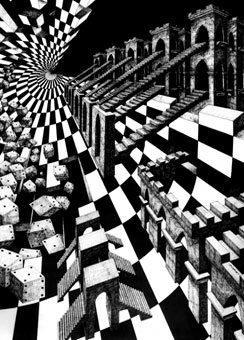|

ABOVE: Big Bang, Credit: Jean-Pierre Luminet.
TOP OF PAGE: "Time sequence of our Milky Way Galaxy showing the formation and expansion of the Galactic Habitable Zone (green). In the early stages of galaxy formation (lower panel) there were not enough heavy elements to form terrestrial planets except in the most central regions of the Galaxy, but there the danger due to nearby supernovae was high (red). As heavy elements spread through the Galaxy terrestrial planets formed and a habitable zone emerged and broadened." Credit: Yeshe Fenner.
| | |  | An interdisciplinary research program to support innovative explorations towards illuminating deep integrative foundational aspects of the nature of reality in physics and cosmology.
This multimillion-dollar research grants program in physics and cosmology aims to stimulate scientific discovery at the physics-philosophy interface through innovative interdisciplinary research on deep integrative foundational aspects of the nature of reality. The program will be structured mainly through a set of major international research grants competitions, linked with topical research workshops, interdisciplinary summer schools and world class scientific meetings. The Foundations Research Project in Physics and Cosmology will be a catalyst towards the creation of a new form of virtual research support network providing research support for the best and the brightest innovators in physics working at the cutting-edge of science where it engages ultimate questions.
This project follows on from an exploratory project in 2002 honoring the distinguished physicist John Archibald Wheeler in his 90th birthday year. Wheeler was renowned as a catalyst for inspiring deep long-term innovation in physics via his posing of ‘really big questions’ (RBQs) such as: “Why the quantum?”; “How come existence?”: “It from bit?”; and “What makes meaning?” This program is inspired by Wheeler’s questing vision in physics. It also is inspired by the spiritual vision of Sir John. This vision looks with enthusiasm and respect to science for its success in unveiling deep new insights relevant in a variety of nuanced ways for addressing the kinds of ‘ultimate questions’ which form a core part of the discipline of philosophical theology.
The Templeton vision for engaging the adventure of scientific ‘deep’ discovery with the intellectual discipline of philosophical theology is shaped by a commitment to epistemic humility in ultimate matters and to the idea that the depths of reality are vast and deep from the point of view of both perspectives: “science” and “theology.” Overall, the spirit of the project is summarized by the Foundation’s motto, “How little we know, how eager to learn.” By supporting the deep adventure of science in various areas of fundamental research, the Foundation seeks to stimulate breakthroughs in human understanding. These especially are sought after in a variety of classic areas of philosophical inquiry, for example: the nature of time, the nature of quantum reality, the ‘ultimate’ nature and source of the rational structure or ‘laws’ that physics maps out, the question of the nature of mind within the physical world, and the nature of the cosmos on the largest possible scales.
|